In the fast-growing eCommerce landscape of the Philippines, businesses are increasingly turning to order fulfillment software to streamline operations and meet customer demands. As online shopping continues to surge, having the right tools to manage orders and inventory efficiently is essential for sustained growth and success.
Furthermore, businesses in the Philippines using order fulfillment software reported significant efficiency and customer satisfaction improvements. This highlights the critical role of automated systems in helping companies stay competitive in today’s fast-paced market.
Without the right order fulfillment software, businesses risk poor integration with eCommerce, ERP, and inventory systems, disrupting data flow and delaying orders. As companies grow, managers also often worry about scalability and adaptability, potentially leading to inefficiencies and increased costs.
Is your business utilizing order fulfillment software to optimize operations? If not, continue reading to discover the 10 best order fulfillment software in the Philippines for 2025 and how it can transform your business.
Table of Contents

Key Takeaways
|
What is an Order Fulfillment Software?
Order fulfillment software is a digital solution that helps businesses manage their order processing, inventory, and shipping more efficiently. It integrates with platforms like eCommerce stores, shipping carriers, and ERP systems to automate and optimize the entire fulfillment process.
This software ensures accuracy in tracking orders, coordinates picking and packing, and facilitates faster delivery times. By streamlining these operations, businesses can reduce errors, improve operational efficiency, and provide better customer service.
In addition, order fulfillment software helps businesses scale by easily handling increased order volumes. This ultimately leads to faster growth, enhanced customer satisfaction, and a more competitive edge in the market.
What are the Benefits of Order Fulfillment Software?

In today’s fast-paced e-commerce landscape, businesses must adopt advanced solutions to stay competitive and meet rising customer expectations. Order fulfillment software offers a comprehensive approach to streamlining operations, improving efficiency, and delivering exceptional service.
By automating key processes, businesses can save time, reduce errors, and focus on enhancing customer satisfaction.
1. Enjoy a reduced order cycle time
Order fulfillment software significantly cuts down the order cycle time, a crucial metric in e-commerce. By integrating with sales channels like Amazon and Shopify, orders are captured and processed in real-time, eliminating manual errors.
Automation is critical in reducing the time spent picking and packing, ensuring faster order processing. Additionally, shipping carrier integration allows businesses to select the quickest and most cost-effective delivery options, helping meet customer expectations for swift delivery.
2. Get greater inventory visibility and access data in real-time
One of the significant advantages of order fulfillment software is real-time inventory tracking. With the integration of barcode scanners and RFID technology, businesses gain full visibility of their stock levels, locations, and movements.
This allows for more accurate stock replenishment and allocation, reducing the risk of stockouts or overstocking. Access to real-time data helps companies avoid lost sales and unnecessary holding costs, directly impacting their bottom line.
3. Easily track key KPIs and performance
Order fulfillment software seamlessly tracks key performance indicators (KPIs), such as order cycle time, order fill rate, and pick rate. Access to these metrics in real-time helps businesses pinpoint areas for improvement, whether optimizing picking strategies or enhancing labor productivity.
This data-driven approach speeds up fulfillment warehouse processes and reduces operational costs. This improved efficiency contributes to a more streamlined, cost-effective operation.
4. Offer enhanced customer experience
A smooth and accurate order fulfillment process is essential to retaining customers, and order fulfillment software ensures just that. Automated workflows guarantee quick, error-free order processing, from picking to shipping.
Customers appreciate real-time tracking and timely deliveries, which lead to higher satisfaction and loyalty. Additionally, the software simplifies the returns process, making it hassle-free for customers and contributing to a better overall experience.
10 Best Order Fulfillment Software in the Philippines
In today’s fast-paced business landscape, selecting the right order fulfilment software is crucial for maintaining operational efficiency and meeting customer expectations. With so many options available, choosing a solution that aligns with your company’s needs, from integration capabilities to scalability, is essential.
Here are 10 of the best order fulfilment software options for 2025 to help you make an informed decision.
1. HashMicro’s Order Fulfillment Software
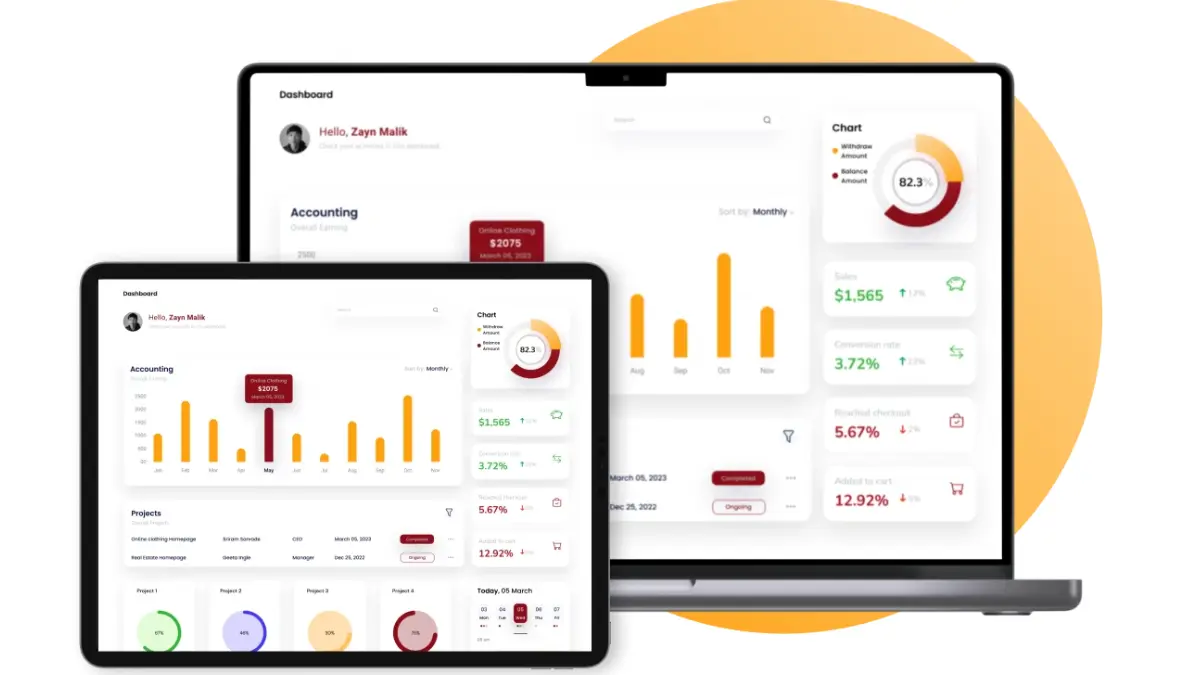
Why we picked this solution: HashMicro is a leading ERP provider in Southeast Asia, renowned for its highly customizable and comprehensive solutions designed to meet the needs of various industries, including eCommerce and logistics.
Founded in 2015, HashMicro has quickly become a key player in the ERP market across Southeast Asia. Its order fulfilment software is engineered to streamline operations, improve order accuracy, and enhance efficiency through automation and advanced resource management.
Explore how HashMicro’s Order Fulfillment Software can transform your operations by signing up for a free demo and consultation with our expert team.
With deep integration capabilities across various modules, HashMicro’s Order Fulfillment Software is an excellent choice for companies looking to scale their operations. Its platform provides AI-driven features and comprehensive support tailored to businesses aiming for smooth order fulfilment processes.
Below are some of the features offered by HashMicro Order Fulfillment Software:
- RFID Warehouse Rack Stock Automation: Use RFID technology to automate the tracking of stock movements within warehouse racks, improving accuracy and efficiency in stock handling. Enabling real-time stock updates whenever goods are moved or placed reduces manual errors and saves time.
- Barcode, Lot, and Serial Number Tracking: Track inventory precisely using barcodes, lot numbers, and serial numbers, ensuring complete traceability of each product. This feature helps prevent errors and improves stock visibility, making managing batches and individual items easier.
- Cycle Time Analysis: Analyze the time taken for each step in the fulfilment process to identify inefficiencies and optimize operations. By reducing cycle time, businesses can speed up order processing, improve customer satisfaction, and reduce overall costs.
- Stock Optimizer per Warehouse: Optimize stock levels for each warehouse by analyzing demand patterns and automatically adjusting inventory quantities. This feature ensures that the right stock is always available at the right location, reducing the risk of stockouts or overstocking.
- 3D View of Stock Location: Visualize your warehouse layout in 3D to better understand stock placement and flow. This feature enhances warehouse navigation and helps staff locate items quickly, reducing picking times and improving efficiency.
- Removal Strategy Management: Implement removal strategies like FIFO (First In, First Out) or FEFO (First Expired, First Out) to ensure efficient and accurate stock rotation. This helps manage perishable goods, reduce waste, and maintain product freshness.
- Pick, Pack, Delivery 3-Step Route Warehousing: Streamline the warehousing process with a structured 3-step route for picking, packing, and delivery. This systematic approach reduces errors, increases speed, and ensures that orders are fulfilled efficiently.
- Comprehensive Reporting/Analytics: Leverage detailed reports and analytics to monitor key performance metrics such as stock levels, order accuracy, and fulfilment times. This data-driven insight helps businesses make informed decisions and continuously improve their operations.
In addition to its robust features, HashMicro’s WMS software seamlessly integrates with third-party systems, ensuring smooth data flow across all platforms. The highly customizable software allows companies to tailor their functionalities to specific warehouse management needs.
| Advantages | Disadvantages |
| Easy to use with a simple interface | Implementation can take time |
| Seamless integration with other platforms | Features are diverse and can be complex, requiring further consultation with a team of professionals |
| Responsive customer support | |
| Highly flexible automation |
After knowing some of the advantages offered by order fulfillment software from HashMicro, you can start considering the price calculation by clicking the banner below. immediately support the success of your Philippine company with HashMicro!

2. Zoho Inventory
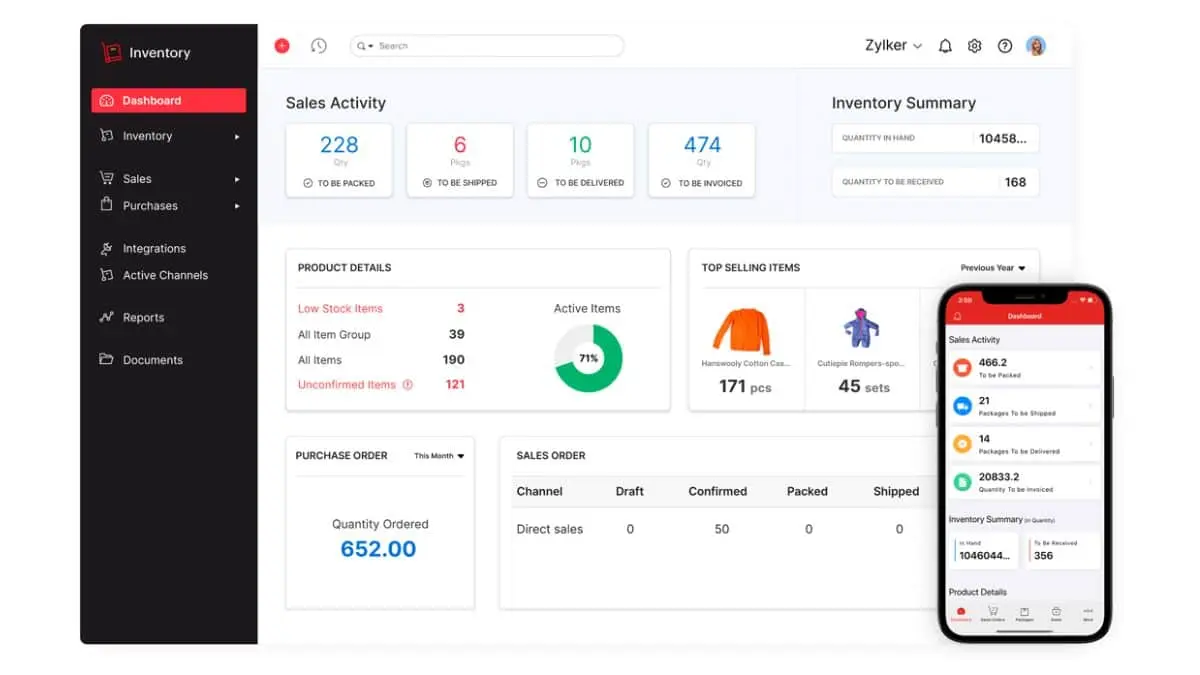
Zoho is a long-established player in the software industry, offering a wide range of business solutions, including order fulfilment. With multi-channel integration and comprehensive automation features, Zoho Inventory is ideal for businesses looking to improve efficiency and accuracy in order management. The platform offers flexibility, a user-friendly interface, and responsive customer support.
Key Features:
- Multi-channel integration
- Automated inventory management
- Real-time order management
- Shipment tracking
| Advantages | Disadvantages |
| Easy to use with a simple interface | Some advanced features require payment |
| Seamless integration with other platforms | Limited for large-scale businesses |
| Responsive customer support | Implementation can take time |
| Highly flexible automation | Limited customization in the basic package |
3. ShipBob
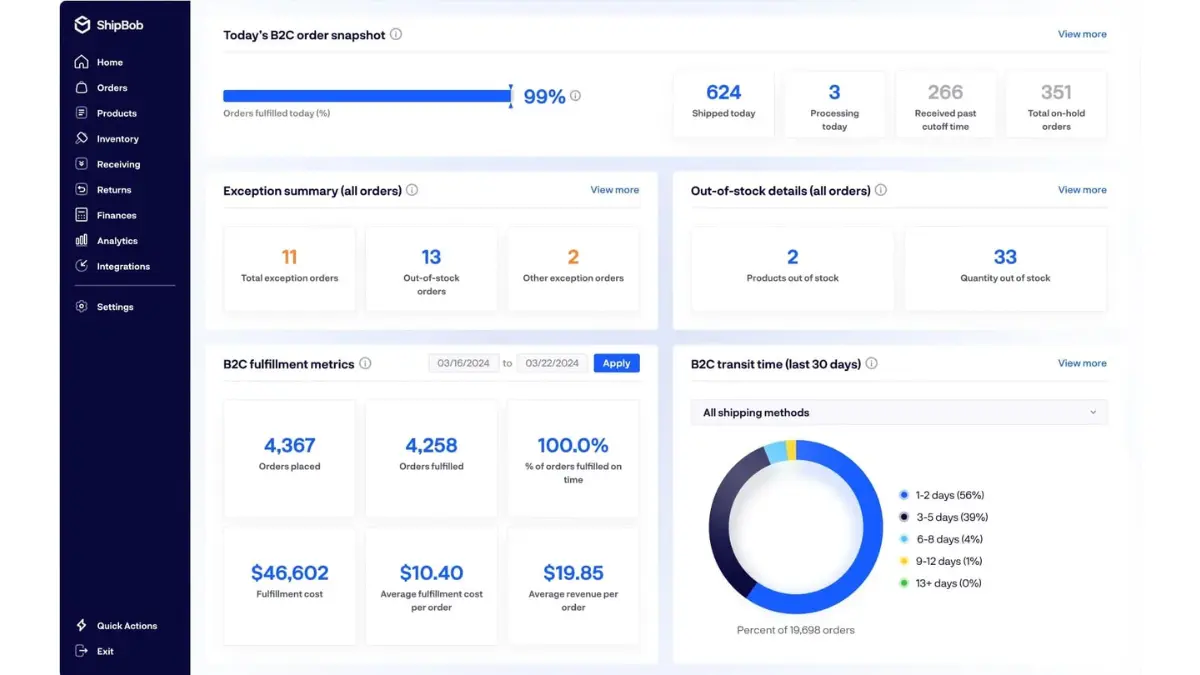
ShipBob is a cloud-based fulfillment software known for offering both software and warehousing services, particularly for eCommerce businesses. It provides full features from inventory management and order tracking to integration with popular eCommerce platforms. ShipBob is an excellent choice for businesses focused on logistics and distribution, providing significant time and cost savings.
Key Features:
- Multi-warehouse management
- Real-time shipment tracking
- Integration with popular marketplaces
- Global logistics support
| Advantages | Disadvantages |
| Accurate inventory tracking | Relatively high pricing |
| Fast shipping services | Dependent on warehouse location |
| Easy integration with Shopify, Amazon | Limited customization options |
| Global logistics support | Not ideal for smaller businesses |
4. NetSuite
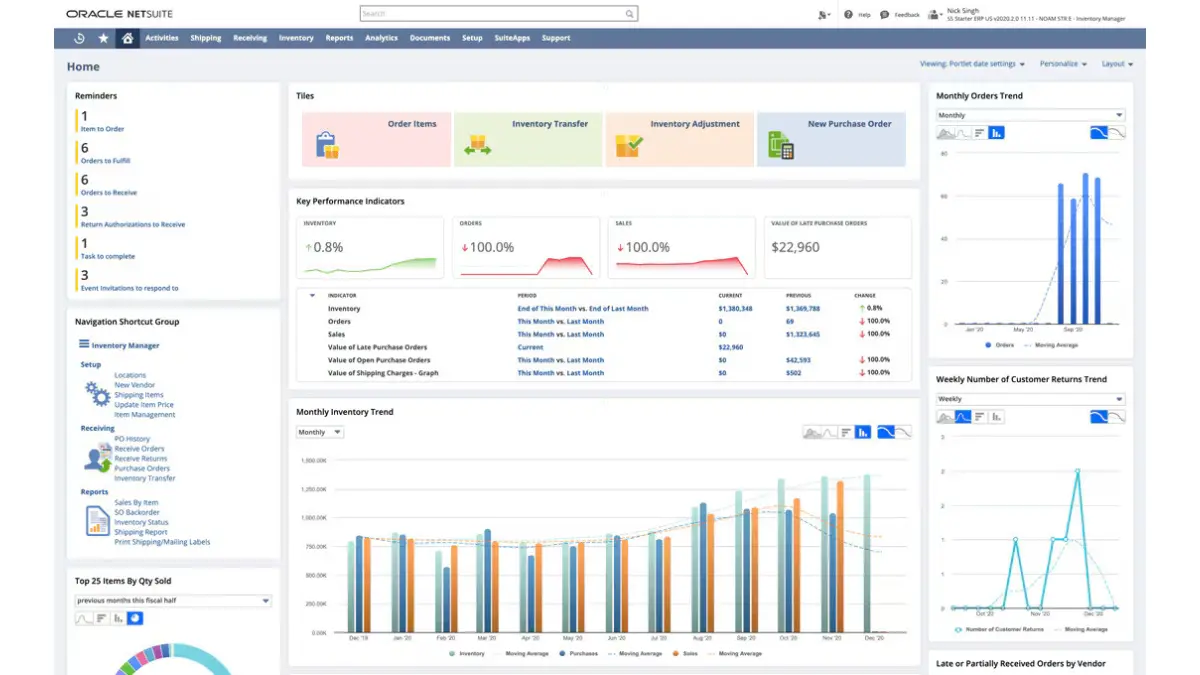
NetSuite is a comprehensive ERP solution that includes integrated order fulfillment features along with financial and inventory management. It offers end-to-end visibility, making it a top choice for large enterprises seeking scalable and flexible solutions. With its intuitive interface and strong technical support, NetSuite minimizes errors and boosts efficiency in fulfillment operations.
Key Features:
- Integrated ERP order management
- Multi-location inventory tracking
- Automated supply chain management
- In-depth analytics reporting
| Advantages | Disadvantages |
| Comprehensive ERP solution | High implementation costs |
| Scalable for large enterprises | Complex configuration process |
| Professional technical support | Requires staff training |
| Detailed analytics and reporting | Expensive annual maintenance fees |
5. SPS Commerce
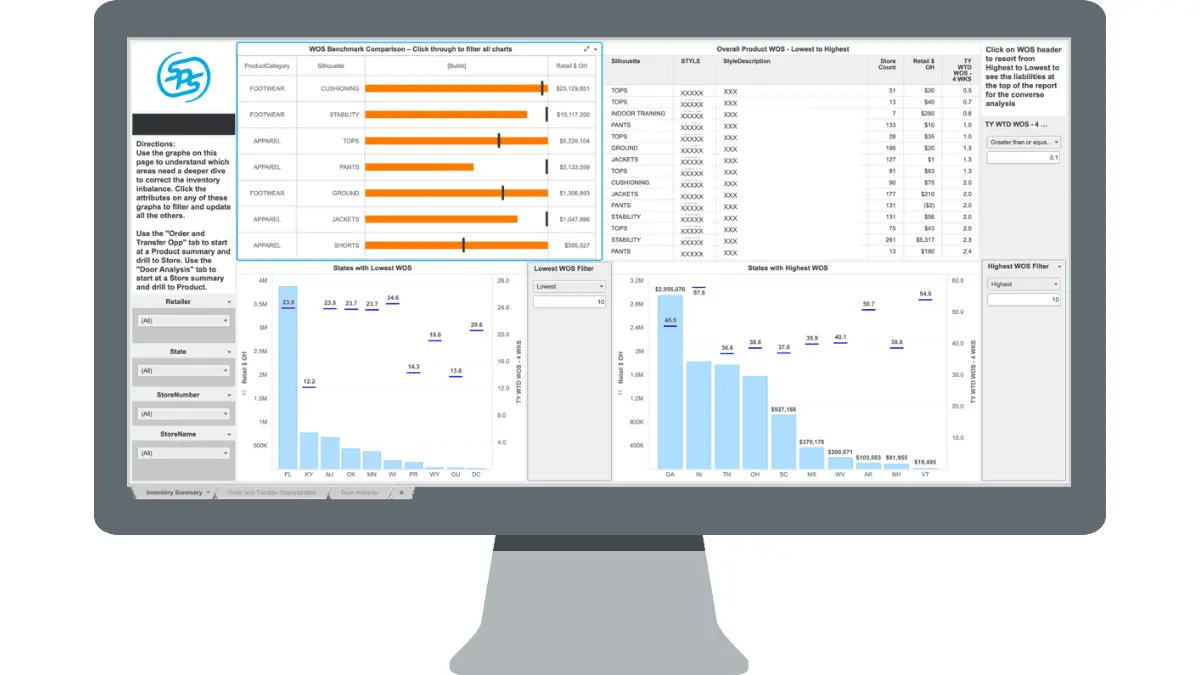
SPS Commerce is a cloud-based fulfillment software designed to enhance collaboration between retailers, suppliers, and distributors. It focuses on automating order processing and shipment tracking to maximize supply chain efficiency. Its business-to-business collaboration features make integration and transparency in order management easier to achieve.
Key Features:
- Supplier and retailer collaboration
- Automated order processing
- Real-time shipment tracking
- Strong ERP and CRM integration
| Advantages | Disadvantages |
| Efficient collaboration between partners | Not ideal for smaller businesses |
| Strong order automation | Setup process can be time-consuming |
| Extensive integration capabilities | Relatively high pricing |
| Responsive customer service | Interface requires adaptation |
6. Extensiv
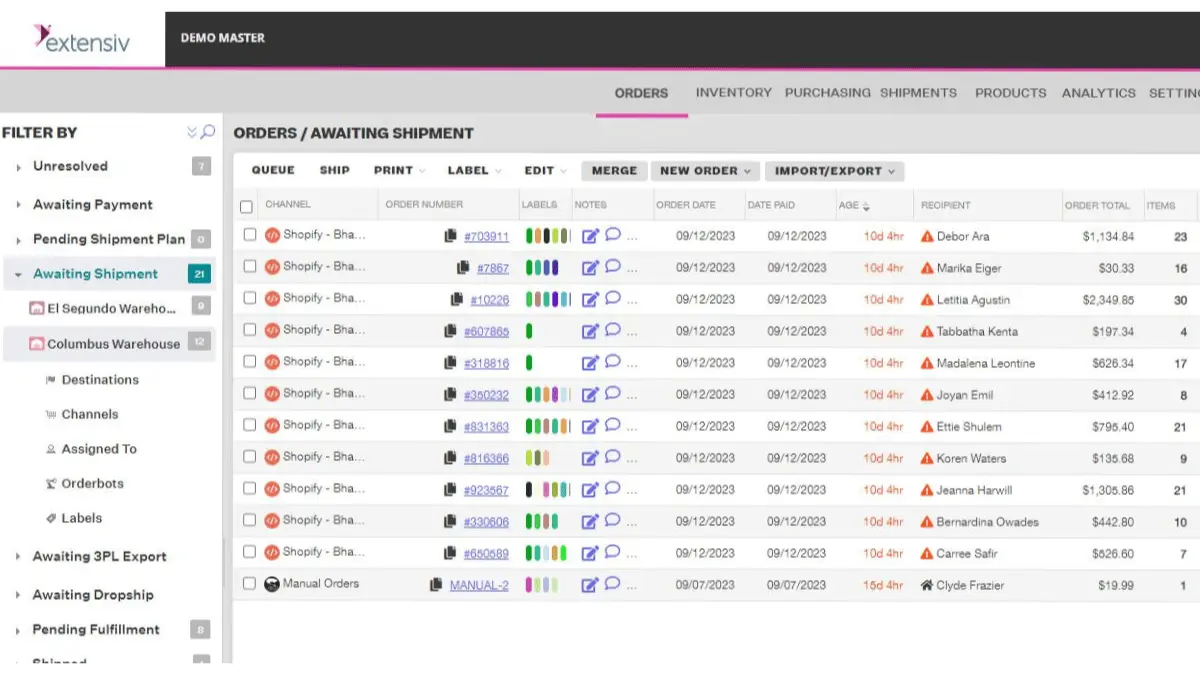
Extensiv provides a robust order fulfillment solution, excelling in multi-channel order management and supply chain integration. It enables businesses to centralize order management from multiple eCommerce platforms and marketplaces. With comprehensive analytics reporting, Extensiv helps businesses optimize their fulfillment processes.
Key Features:
- Multi-channel order management
- Real-time analytics reporting
- Integration with eCommerce platforms
- Automated fulfillment processes
| Advantages | Disadvantages |
| Extensive multi-channel integration | Relatively high implementation costs |
| Efficient automation | Takes time to configure |
| Comprehensive analytics | Not suitable for small businesses |
| High scalability | Requires user training |
7. Logiwa
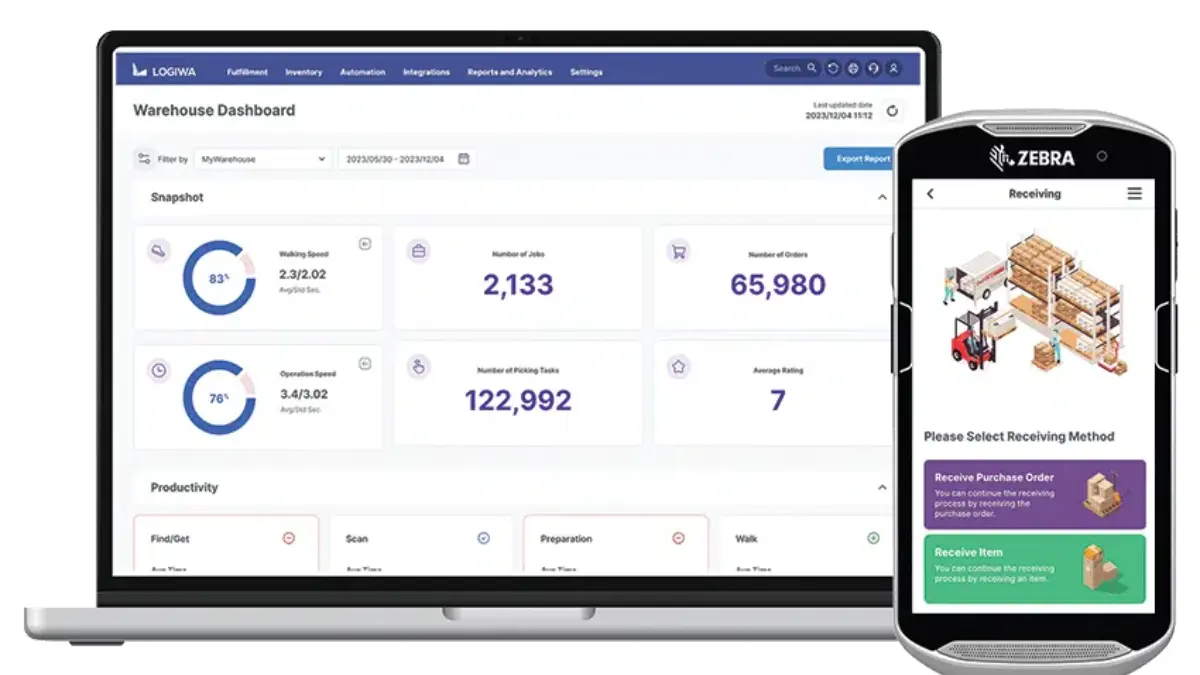
Logiwa is a cloud-based fulfillment software focusing on warehouse and inventory management for eCommerce businesses. It offers strong multi-platform integration, helping businesses manage inventory with high accuracy. Logiwa also features real-time order and shipment tracking, providing a complete solution for managing fulfillment processes.
Key Features:
- Centralized warehouse management
- Multi-platform eCommerce integration
- Real-time inventory tracking
- Automated order management
| Advantages | Disadvantages |
| Accurate warehouse management | Requires time for integration |
| Integration with popular platforms | Limited customization options |
| Easy order tracking | Relatively high implementation cost |
| Efficient order automation | Not ideal for small-scale businesses |
8. Magaya Supply Chain
Magaya Supply Chain offers a comprehensive solution for managing supply chain and order fulfillment. With features like shipment tracking, order automation, and inventory management, Magaya keeps the supply chain efficient. Its support for multi-platform integration also simplifies the fulfillment process for businesses.
Key Features:
- Real-time shipment tracking
- Automated supply chain management
- Comprehensive inventory management
- External platform integration support
| Advantages | Disadvantages |
| Extensive integration capabilities | Relatively high pricing |
| Effective supply chain automation | Interface takes time to adapt |
| Accurate inventory tracking | Not ideal for small businesses |
| Responsive customer support | Implementation process can be complex |
9. QuickBooks Enterprise
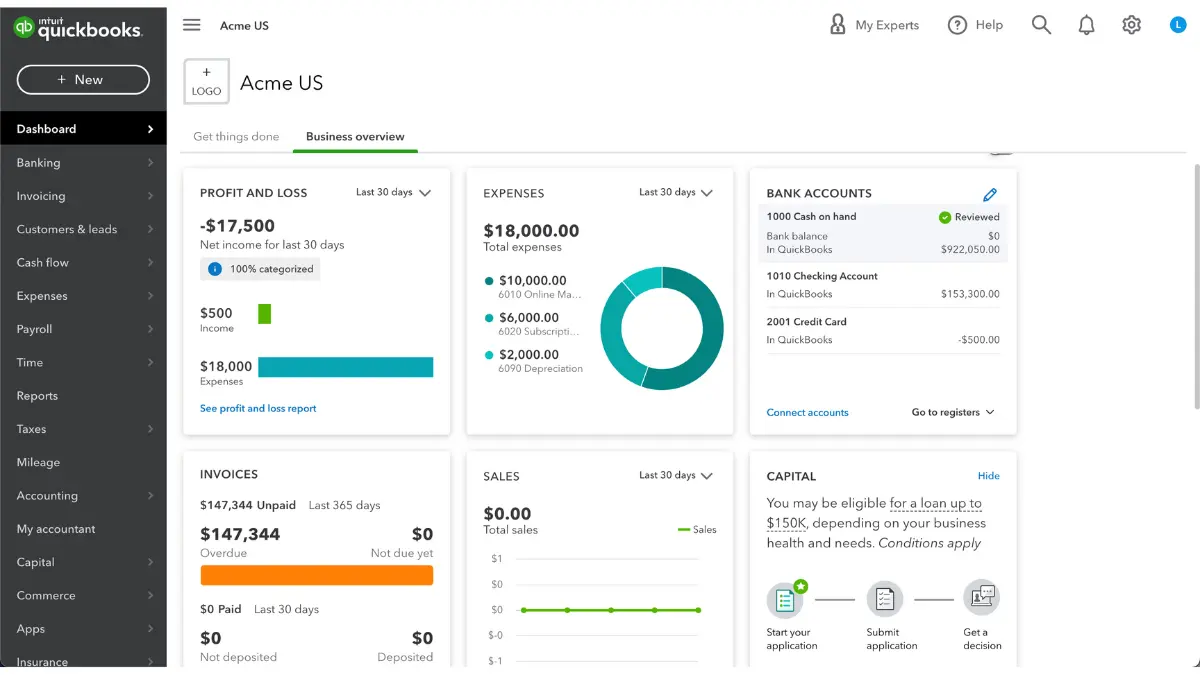
QuickBooks Enterprise is well-known for its financial management capabilities, but it also offers integrated order fulfillment solutions. Its robust order and inventory management features make QuickBooks accounting a powerful tool that helps businesses maintain a smooth workflow.
QuickBooks accounting software is ideal for companies seeking an all-in-one solution that merges financial management with fulfillment.
Key Features:
- Integrated inventory management
- Real-time order reporting
- Automated order processing
- Integration with accounting software
| Advantages | Disadvantages |
| Comprehensive financial management | Less flexible for large enterprises |
| Efficient inventory tracking | Paid advanced features |
| Strong customer support | Limited integration with some platforms |
| Easy to use | High annual subscription costs |
10. Mintsoft
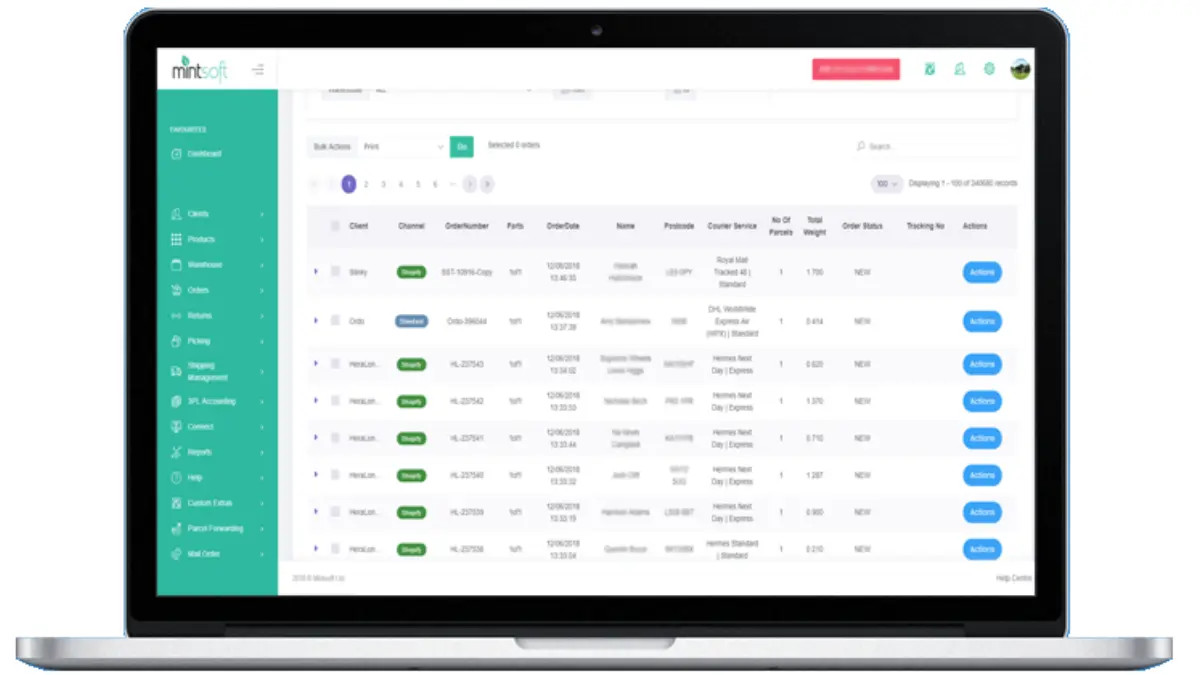
Mintsoft is a cloud-based solution designed to help eCommerce businesses efficiently manage their inventory and orders. With multi-channel capabilities and real-time shipment tracking, Mintsoft simplifies the end-to-end fulfillment process. It’s ideal for companies looking to speed up order processing and enhance accuracy.
Key Features:
- Multi-channel eCommerce management
- Real-time order tracking
- Automated fulfillment processes
- Centralized inventory management
| Advantages | Disadvantages |
| Accurate inventory tracking | Interface requires adaptation |
| Strong order automation | Limited customization options |
| Extensive integration capabilities | High subscription pricing |
| Real-time reporting | Requires time for user training |
Features to Look for in Order Fulfillment Software

When selecting the right order fulfillment software for your business, focusing on features that optimize processes and support your growth is crucial. The right software can improve operational efficiency, minimize errors, and enhance the customer experience.
Below are some essential features to look for to ensure your fulfillment operations run smoothly and effectively.
1. Multi-channel integration
Managing orders from multiple sales channels is crucial in today’s omnichannel retail environment. Order fulfillment software with multi-channel integration allows you to centralize orders from platforms like Shopify, Amazon, or WooCommerce in one system.
This reduces the risk of errors and delays caused by manually reconciling orders from various sources. Managing all sales channels in a unified platform ensures smoother operations and a better overall customer experience.
2. Guided order processing
Order fulfillment software that offers guided order processing ensures consistency and accuracy throughout the fulfillment process. It provides step-by-step prompts for employees, reducing the chances of errors and speeding up training for new staff.
From picking items to shipping, the system guides employees through every task, ensuring that each order is processed according to your business rules. This ultimately leads to faster, more reliable order fulfillment.
3. Flexible fulfillment workflows
No two businesses have the exact fulfillment needs, so flexibility is critical. With a flexible fulfillment workflow, you can customize your processes to suit your business, whether you handle simple pick-pack-ship tasks or more complex activities like kitting or assembly.
Tailoring workflows to match order types, customer preferences, or product attributes ensures that your operations stay agile and efficient. This adaptability is critical for scaling and managing diverse order types.
4. Robust shipping module
A robust shipping module is essential for streamlining shipping operations and reducing costs. Look for features like rate shopping, which compares shipping rates across carriers, and automatic label generation.
Carrier integration is equally important. It allows you to choose the most cost-effective and fastest shipping methods. This module should also provide real-time shipment tracking, helping you keep customers informed and satisfied with prompt deliveries.
5. Inventory and order tracking
Having real-time inventory and order-tracking capabilities is vital for effective fulfillment. Good order fulfillment software offers visibility into stock levels, locations, and movements, preventing stockouts or overstocking.
Real-time order tracking also allows you to monitor each order’s progress from receipt to delivery. This transparency ensures you can meet customer expectations and avoid issues caused by inventory mismanagement.
6. Advanced analytics
Analytics is crucial for optimizing your fulfillment processes. Look for software that provides advanced analytics with customizable reports and dashboards. These insights will help you track key metrics such as order accuracy, fulfillment times, and shipping costs.
By analyzing this data, you can make informed decisions that improve efficiency and reduce operational costs, driving continuous improvement across your fulfillment operations.
Factors to Consider when Choosing an Order Fulfillment Software

When selecting the right order fulfillment software for your business, ensuring that the solution aligns with your operational needs and long-term goals is essential. Well-chosen software can streamline processes, reduce errors, and improve efficiency.
However, with various options available, knowing which factors to prioritize is crucial for making the right decision. Here are key factors to consider when choosing an order fulfillment software.
- Assess your business needs: Evaluate your unique operational requirements, including order volumes, product types, and sales channels. The software should align with your business model and meet industry-specific regulations, ensuring smooth fulfillment processes.
- Scalability: Choose software that grows with your business, handling increased order volumes and expanding product lines. It should adapt to your long-term growth strategy without causing disruptions or requiring costly upgrades.
- Cost and ROI: Consider the total cost, including setup and ongoing fees, and weigh it against potential savings from improved efficiency. Ensure the software delivers a solid return on investment by speeding up fulfillment and improving customer satisfaction.
- Integration capabilities: The software must integrate seamlessly with your current systems, from eCommerce platforms to CRM and shipping carriers. This ensures efficient data flow, eliminates silos, and optimizes your overall operations.
- Customizable: Look for software tailored to your specific workflows, from order processing to shipping preferences. Customizability ensures that the software adapts to your needs, enhancing operational flexibility and efficiency.
Conclusion
Order fulfillment software plays a crucial role in the growth of businesses in the Philippines, especially as the eCommerce industry continues to expand. By automating key processes such as order tracking, inventory management, and shipping, companies can boost efficiency, reduce errors, and ultimately provide a better customer experience, helping them stay competitive in the fast-paced market.
HashMicro’s Warehouse Management System offers a comprehensive solution for businesses looking to optimize their order fulfillment processes. With seamless integration across platforms and real-time tracking, HashMicro ensures that your operations run smoothly, making it an ideal choice for companies aiming to scale and succeed in the Philippines.
To explore how HashMicro can transform your business, they offer a free demo that allows you to experience the software’s full capabilities firsthand. This is an excellent opportunity to discover the unique features that can help streamline your operations and drive long-term growth.
FAQ About Order Fulfillment Software
-
What is an order fulfillment method?
Order fulfillment involves receiving, processing, and delivering products to customers. The process begins when a customer orders and concludes after receiving their purchase. Still, it also includes handling return transactions if the customer returns the item.
-
What are the 7 steps of the order fulfillment process?
1.Receiving Inventory: After a customer places an order, the company quickly acquires the necessary inventory and prepares it for shipment. This ensures stock is available and ready for the fulfillment process.
2. Storing Inventory: Once received, the inventory is organized and stored in a warehouse or storage facility. Efficient storage is crucial for easy access and quick order processing.
3. Processing Orders: When an order is placed, the fulfillment system processes it by confirming the item, quantity, and customer details. This step ensures the accuracy and smooth flow of the entire process.
4. Picking Teams: A dedicated picking team retrieves items from storage based on customer orders. They ensure the right products are selected and prepared for packing.
5. Packing Materials: After picking, the products are securely packed using appropriate materials to protect them during shipping. Proper packing reduces the risk of damage in transit.
6. Shipping Orders: Once packed, orders are sent out for delivery through selected shipping carriers. This step includes tracking shipments to ensure timely and accurate delivery to customers.
7. Processing Returns: If a customer returns an item, the fulfillment team handles the return process efficiently. This includes inspecting the returned product and updating inventory accordingly. -
What are the three types of order fulfillment?
1.In-house Fulfillment: In this model, the business handles all aspects of order fulfillment internally. This includes managing inventory, packing, and shipping directly from the company’s warehouse or facility.
2. Outsourcing Fulfillment: With outsourcing, businesses partner with third-party logistics (3PL) providers who manage the entire fulfillment process. These external providers handle everything from storing inventory to shipping orders on behalf of the business.
3. Drop Shipping: In the drop-shipping model, merchants don’t hold inventory. Instead, when an order is placed, the supplier ships the product directly to the customer, allowing the business to focus on sales and marketing without managing physical stock.




































